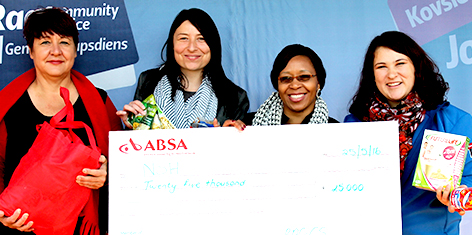Latest News Archive
Please select Category, Year, and then Month to display items
10 March 2022
|
Story Anthony Mthembu
|
Photo Unsplash
 The No Student Hungry team gearing up to start distributing food parcels to the selected students.
The No Student Hungry team gearing up to start distributing food parcels to the selected students.
The UFS is one of the many institutions of higher learning where food insecurity is an active issue. However, the
No Student Hungry Programme is one of the initiatives launched at the university to assist in fighting food insecurity at the institution.
The purpose of the programme
Since its inception in 2011, the initiative has assisted many students in acquiring a healthy meal. Additionally, the Food Environment Office also hands out food packages, so that students can continue to achieve academically. “We are trying to develop a healthy environment for students and make it easier for them to have a nice and healthy meal,” stated Annelize Visagie, who heads the Food Environment Office at the UFS. The Food Environment programme is spread out on all three campuses, each with its own facilitators. Furthermore, the programme mainly caters for students who are not funded by the National Student Financial Aid Scheme (NSFAS) but who are excelling academically. The abovementioned students apply for assistance online, and a list is then drawn up of students who receive assistance for the year.
Alternative solutions to keep the initiative running
On the Bloemfontein Campus, the No Student Hungry Programme will be catering for 200 students in the 2022 academic year, assisting them with a daily nutritious meal. Additional food parcels are also handed out to provide further assistance. “We give food parcels to the students on the list every Tuesday and Thursday at the Thakaneng Bridge,” Visagie highlighted. However, she argues that catering for the student population through this programme can be a challenge, as the demand for assistance is growing rapidly and the ability to assist is limited. The programme relies on partnerships and sponsors to assist the student body. In fact, the coordinators of the programme currently have a memorandum of understanding with Tiger Brands according to which they deliver around 100 food parcels for distribution.
In addition, the coordinators have put in place alternative measures to ensure that they can provide more food to students. “The
Kovsie Act Office, in partnership with the
Department of Sustainable Food Systems and Development, has started a food garden where healthy and nutritious produce are grown, in order to add value to the distribution,” she indicated. Although the programme can only assist to a point, students who are in desperate need of assistance are never turned away. In fact, the
Social Support Unit at Thakaneng Bridge usually assists students with food vouchers for a maximum of four days.
A commitment to teaching healthy eating habits
The programme is not only committed to curbing food insecurity, but also to ensuring that students have a healthy and balanced diet. As such, a booklet is being issued by the
Department of Nutrition and Dietetics in collaboration with the Department of Sustainable Food Systems and Development, which contains ways in which students can make a healthy meal using some of the ingredients offered in the food parcels.
“We want to teach students how to eat healthy in the cheapest way, because they don’t have a lot of money to buy expensive food products,” Visagie argued.
UFS community makes difference through Big Give Project
2016-06-10
 Food for the needy. From left is Annelize Visagie, Health and Wellness;
Food for the needy. From left is Annelize Visagie, Health and Wellness;
Vicky Simpson, No Student Hungry Food Bursary Programme;
Elizabeth Msadu, Health and Wellness; and Lorinda Slippers, Student
Representative Council Rag Community Service, at the handover of
the food and cash collected by the RAG Big Give Project. Photo: Jóhann Thormählen
Thanks to the caring community of the University of the Free State (UFS), students in need were provided for during exams, and will receive more food in the cold winter months.
Once again, staff and students made valuable contributions at the successful RAG Big Give Project, where food contributions of R 38 176.20 and cash donations of R25 000 were received. Staff, residences, and the RAG Committee made these donations as part of the project on 5 May 2016, when contributions were made at the Bloemfontein Campus gates of the UFS. An extra donation by Imperium, a residence on the Bloemfontein Campus, of R20 000 for FutureLife helped to achieve the grand total of food contributions.
According to Vicky Simpson, Assistant Officer at the No Student Hungry Food Bursary Programme (NSH), the food donation is for a designated group of students who have already been identified as food insecure by the social work office. “It will be distributed to them on a monthly basis,” she said.
The handover of food collected was done on 25 May 2016 at the RAG Food store by the RAG Office to Health and Wellness and the NSH. The RAG Office thanked the UFS community for its contributions to the project. Parexel, who made cash and food donations, received special mention. Simpson said “the food will make a huge difference in the lives of students who do not know where their next meal will come from”.
According to Jaco Faul, Senior Assistant Officer Rag CS, his office is already looking forward to the next instalment of the Big Give Project. “We challenge faculties and staff members for the forthcoming Rag Big Give project in October to see if we can beat the amount collected this time.”